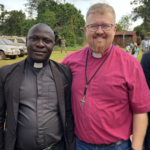
Why I Chose To Research Sexual Identity
Updated
18
November, 2021
Originally published 8 February 2016
Sexuality identity and gender orientation are some of the most pressing ethical issues of our day. I arrived at this conclusion only after spending years in academic research trying to make sense of the relationship between sexual identity and the gospel. As I am slowly releasing my research to the public, I thought it would be helpful to share a brief story of why I chose to study sexuality.
What follows below is a brief account of a journey I have been on to discover how to “speak” the gospel in an extremely volatile area of our culture. As I found, the stakes surrounding sexual identity couldn’t be any higher for the person, the church, our nation and the world.
The Beginning
So let me first be honest. Sexual identity was the second choice of mine. When I began my doctoral work, I was intensely interested in a different field. My advisor had been a successful church planter, and I had high hopes I could speak into that field of study. Excited for the opportunity, I shared with him my church planting wisdom. Within five minutes of my presentation, he shot down the idea, and my aspirations went down in a blaze of humiliation. I knew that I would have to pursue another angle. It appeared God had other plans for my work.
A few weeks later I received an essay back with a grade and remark attached, “Excellent paper. You should consider expanding this idea in a master’s thesis or doctoral dissertation.” The title of that essay was, “Gospel Ethics and Homosexuality.” The genesis of the idea came from a question I was asking myself: “How do I share the gospel with a gay person?” I know that sounds basic, but for a straight guy from the south, this is just where I was at the time.
This question came from the fact that my family and I lived on the edge of a gay neighborhood in Fort Lauderdale.
Armed with new encouragement, I wrote another dissertation proposal and submitted it to my advisor. My essay and the fateful meeting with my advisor turned out to be the providence of God. He loved it, and I now had my topic.
Sexual Identity and the Closet
Without realizing it and still excited about having an actual doctoral topic, it didn’t occur to me that I was walking into an area of deep pain, great suspicion, and a source of deep shame. Almost immediately, I was confronted by this new reality.
You see, every time I shared with people my research topic, I noticed people seemed uncomfortable. I quickly discovered that most people just do not like talking about sexuality. But as I will share later, that is part of the problem.
My immediate family was embarrassed, and my extended family started looking at me with some suspicion — as if I was secretly coming out of the closet. In a way, I was being treated as if I had confessed to struggling with sexual identity issues. I can’t tell you how frustrating that experience became.
I quickly realized that I was going to have to be somewhat covert about my research. I quieted down my enthusiasm and began to do the work. I spent countless hours reading LGBT resources, psychology and sociology journals, websites, commentaries, and theology book after theology book. I combed through these resources sometimes despairing that I would never reach the end. The work went very slowly at first. And let me tell you, it was depressing — plain depressing.
Sexual Identity and Apostasy
But then an article jarred me out of my research fog. One day as I was pouring through journal articles, I read these words.
“If the perception exists “that God cannot accept homosexuality, then accepting one’s own sexuality may come at the price of abandoning God,” apostasy appears to be “an unavoidable conclusion.”[1]
The author’s conclusion seemed puzzling to me. According to the article, there was no hope for any of my homosexual friends, parishioners, and family members. These researchers appeared to conclude that no relationship between orthodox faith and homosexuality could occur. So I asked myself, “Is apostasy the unavoidable conclusion for every person with a same-sex attraction impulse? Is this the message the church (myself as a churchman) was sending to the world?”
As I began to labor over the issue, I realized that the problem was with the definition of homosexuality. That word fuses together a couple of ideas that need separating. Those ideas are sexual attraction, sexual behavior, relational intimacy, ethics, and personal identity. Consider this scenario:
A person may have same-sex attraction, but never act upon the attraction or no longer acts upon those desires. Is that person still gay? And if those impulses are present within someone, does this mean that God is angry as in the Romans 1 sense? Is the issue “acceptance” really the entire theological issue?
Just because same-sex sexual desires are present, must they necessarily be acted upon? And if those desires are present within a person, contrary to their will, does this make a person gay, lesbian, bi, etc?
Gay Christians and the Gospel
I spent a lot of time thinking about questions just like the ones above. Questions like these need to be better thought through. Tragically, on any given Sunday morning, they are not commonly discussed. But they need to be. We need ministers to have the guts to hold two truths in tension: God’s limitation on sexual behavior and God’s love for the world (John 3:16). Sometimes the church forgets the second one and overemphasizes the first one.
So the thrust of my research is the following: “how does a church, who desires to remain faithful to the historical interpretation of the Bible, minister to gay Christians?” Do you see where the emphasis rests? The impetus rests on the church.
In the ongoing debate regarding human sexuality, church leaders must figure out a way to avoid placing gay Christians in the political crossfire. We must remember that Jesus primarily hung out with tax collectors and sinners (Mark 2:15-16) and simultaneously despised Pharisees (Matt. 21:31). In the current rhetorical wars, I wonder if Jesus would be supportive of the positions we take?
Paul’s words still apply — “where sin abounded, grace abounded much more” (Rom. 5:20). If the church has any hope of changing the current trajectory of the present conflict on sexual identity, then the church must figure out a way to begin speaking hope into an area of desperate brokenness. For Evangelicals, Paul’s words must be real — nothing “will be able to separate us from the love of God in Christ Jesus our Lord.”
——————————————-
[1] R. R.van der Laan Ganzevoort, E. M. Olsman, 2011. “Growing up gay and religious. Conflict, dialogue, and religious identity strategies.” Mental Health, Religion & Culture 14, no. 3: 209-222.





Veri insightful. Thanks for sharing.
Your welcome Janet. Thank you so much for your comment. So great to hear from you!
Great
excellent work..I want to know more about your research.
Elio, the best way to learn more about my research is to check back regularly. I’m working on an E-Book of my research and should have it out soon!
Dear Pastor Friend, You do not know how your words have encouraged my husband and me. We have been out of fellowship with any institutional church for 5 years now, because we have a gay son who once was a professing Christian, but has been “far away” for obvious reasons. We have studied hard to understand him and others like him. One of our sons “accidentally” found your website while looking for a church in Orlando that had a Christmas Eve worship service. He found YOU, and told us about you. We have been listening to your teachings and reading about you, and we have hope that there really is someone who understands what we have been learning in our search to understand God’s loving, compassionate heart for these people that He has created. We came from a PCA church in Lake Co. and had raised our family of 8 children there for 23 years. My husband was an elder, and we were very much a part of everything happening. It is our youngest child – Zac, who is 24 now and has been living in CA for the past 5 years, who came out to us and thus we left our church because there was only a horrible silence when we were desperately needing some help. Anyway, for now, that is enough to tell you. I hope that we can meet you in person and continue sharing our story. Thank you, thank you, thank you for being there. Love, in Christ, Janis Spalding ( for Tim Spalding)
Janis, thank you for reaching out to me. Your story touched me. I’m grieved by how the deafening silence drove you away from the precious body of Christ. I will pray for you and welcome you to visit Redeemer. Also, if you would like a place to meet other parents, I encourage you to reach out to Exchange Ministries. There you will find a group of people who have walked a similar journey as yours. Grace and Peace.